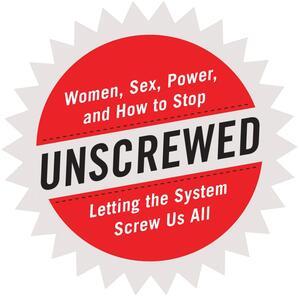Unscrewing Ourselves
Could Jaclyn Friedman have picked a more apt time to publish her newest book, Unscrewed? Subtitled “Women, Sex, Power, and How to Stop letting the System Screw Us All,” Friedman’s book dives into the national narrative of female sexual submissiveness that’s perpetuated by our patriarchal culture. This narrative comes in the form of abstinence-only sex education, widespread toxic masculinity, and a collective reluctance to support women’s sexuality on a social and political level. She paints a bleak (but realistic) picture of all the work still left for America’s women to be fully “unscrewed.”
In an interview with Rewire, Friedman reflects on the term “unscrewed,” saying:
Unscrewed is the project of repairing (or, in some parts, tearing down and rebuilding) the sexual culture. We are so, so screwed by the ”fauxpowerment” model of getting free: focusing on individual quick fixes that only temporarily make individual women feel more sexy or sexually free … Fauxpowerment is a distraction that keeps us from doing the work of actual sexual liberation, which requires us to work together, in community and solidarity, to fix the systems that are actually keeping us oppressed. Unscrewed is about locating the problem where it actually is—in the systems that make up our sexual culture—so that we can together build something that works for everyone.
Above all, Unscrewed is a narrative of hope.
For each attempt to make abortion inaccessible, each school that refuses to teach a sex-ed curriculum that would actually benefit their students, each law that further disenfranchises sex workers, Friedman highlights a group or activist working to change the way our country understands sex, female sexual pleasure, and consent; imbuing the conversation with humor, empathy, and communication.
I really need this book because, dear reader, I sometimes find myself screwed, sexually.
First of all, let me say that I am not often at a loss for words. I am chatty, making friends and building connections on airplanes, in the grocery line, and at work, where I spend my days discussing and writing about feminism and Jewish women’s history.
The only time I fall silent is when the conversation turns to sex and sexuality. As a young woman who grew up in North Carolina and received an abstinence-only education, my sex-ed had three rules: don’t masturbate, don’t have sex, don’t get pregnant.
In a culture that taught me that men’s approval was everything, I, unlike the more fortunate Bari Weiss, didn’t have opportunities to develop the skills to say, “I don’t want to do that.” I was too busy being taught that the only currency I have is in being “nice” and that nice means being accommodating, agreeable, and sexually silent.
This lack of vocabulary left me vulnerable and, when female silence was coupled with male sexual entitlement, my #MeToo moments seem almost inevitable in retrospect. They weren’t, of course.
There has been another facet to my lack of sexual vocabulary. Our sexual culture hasn’t just hindered my ability to say no to unwanted sexual attention, it has left an empty space where my sexual identity, my ability to articulate what I do want and what does or doesn’t feel good, should go. In the conversation about my own pleasure, my sex-ed and socialization have left me speechless.
Friedman writes, “When schools refuse to acknowledge pleasure, they reinforce the idea that sex isn’t really for or about us.” Abstinence-only sex ed didn’t result in my not having sex, but it sure resulted in fewer orgasms and a steep learning curve when it came to choosing respectful partners who were interested in my pleasure.
I, like many of the women in Friedman’s book, don’t often have the hot, feminist, empowered sex I want, mostly because that kind of sex requires a level of communication, self-knowledge, and education that I was actively discouraged from for most of my life.
For Friedman, this type of education, of learning about your own body and developing healthy boundaries, would start young for children of all genders. Her book takes a panoramic view of today’s landscape when it comes to sex, policy, and education. Friedman highlights the revolutionary activism that’s happening within this landscape. She is equally comfortable sharing student initiatives for consent-based sex ed, spotlighting organizations that support sex workers, and recounting a time she watched (feminist and ethically made) porn while participating in research about the physical effects of porn for women. Friedman makes clear that ––while the current administration, our political leaders, and the Religious Right are working to make sexual activism even less accessible than it already is–– there are people trying to imbue our sexual narrative with the curiosity, acceptance, and flexibility that this kind of conversation deserves.
As institutions are being toppled by women owning their experiences, Friedman’s book is the toolkit we need to build something bigger, better, and more joyful in their place. More importantly, Friedman’s research highlights that this work is already happening; these possibilities are already being built. We just have to join in the work, amplifying its efforts and bringing our own experiences to the table.
This reimagining can’t happen alone. It requires each of us to speak up about our experiences, not just the ones of clear violation, but the ones that highlight how the positives of sex: pleasure, connection, personal growth, increased self-knowledge, etc. have also been erased from the national narrative.
So, how do we get unscrewed? We work together, share our intimate experiences of not only pain but pleasure, and remember that when we are talking about changing our national narrative to include women’s sexual pleasure, we aren’t talking about a special-interest topic, we are talking about justice.
We unscrew ourselves by building a society that allows us to claim our sexual humanity. To quote Friedman, we do this “not just by playing defense, destigmatizing, rejecting blame and shame and fear and violence … We must also sing the songs of our own powers, of our personal strange beauty … and we have to listen when others do the same.”
That’s how we unscrew ourselves: by exploring and sharing and supporting, by speaking our truth, and working for change. Loudly and together.
Unscrewed is a JWA Book Club pick; see our discussion questions for the book.







